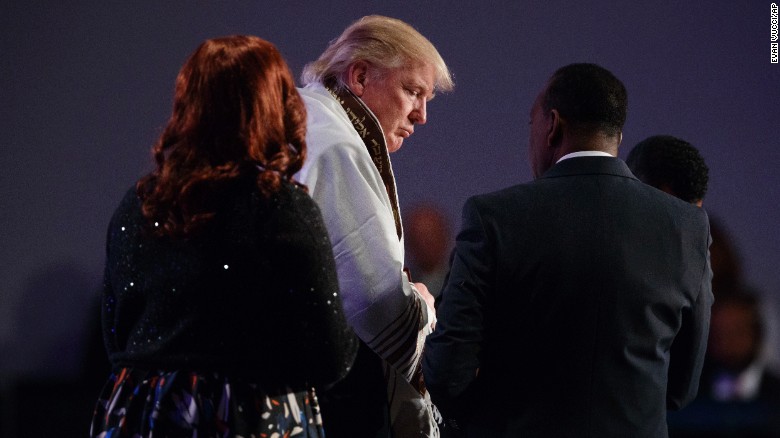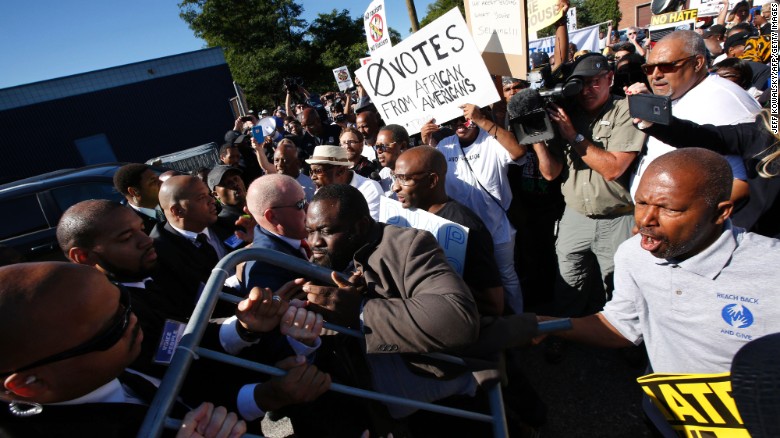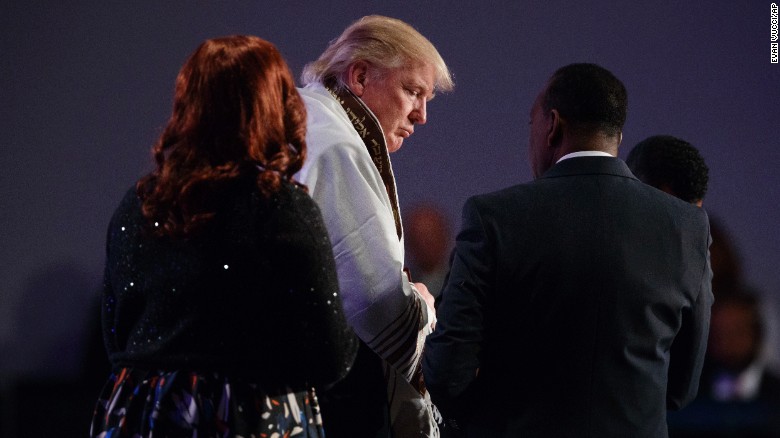Trump brings message of unity to black church in Detroit
A subdued Donald Trump on Saturday directly addressed a largely African-American audience for the first time as a presidential candidate, delivering a warmly received message of unity that focused on fixing economic hardship in the black community.
Trump spoke to members of the Great Faith Ministries, a nondenominational church in Detroit, part of his outreach to what is typically a sizable Democratic voting bloc. His visit, however, was greeted by protests outside of the church ahead of his arrival.
Sitting in a pew at the front of the congregation, Trump took a selfie with a church member and at one point held up a baby over his shoulders. He then addressed the congregation.
"For centuries, the African-American church has been the conscience of this country. So true," Trump said, reading from prepared remarks. He added, "The African-American faith community has been one of God's greatest gifts to America and its people."
Trump told the audience he was there to "listen to your message" and said he hoped his appearance would "also help your voice to reach new audiences in our country." He said he would lay out his plans for economic change and school choice -- issues that he said would benefit black communities -- in the future.
"When I see wages falling, people out of work, I know the hardships this inflicts and I am determined to do something about it. I will do something about it," Trump said. "I do get things done, I will tell you. I'm going to get things done."
Speaking in a measured tone, Trump lamented what he said was a nation that was "too divided."
"We talk past each other and not to each other. And those who seek office do not do enough to step into the community and learn what's going on. I'm here today to learn, so that we can together remedy injustice in any form, and so that we can also remedy economics so that the African-American community can benefit economically through jobs and income and so many other different ways."
"I believe we need a civil rights agenda for our time," said Trump, before he concluded by citing 1 John 4:12.
"No one has ever seen God, but if we love one another, God lives in us and his love is made complete in us," Trump said, adding, "That's so true."
Draped with prayer shawl
After Trump finished speaking, the church's pastor, Bishop Wayne Jackson, draped a prayer shawl over Trump's shoulders, much to the crowd's delight, and handed him a Jewish Heritage Study Bible.
"This is a prayer shawl straight from Israel. Whenever you're flying from coast to coast -- I know you just came back from Mexico and you'll be flying from city to city -- there is an anointing. And anointing is the power of God," Jackson said. "It's going to be sometimes in your life that you're going to feel forsaken, you're going to feel down, but the anointing is going to lift you up. I prayed over this personally and I fasted over it, and I wanted to just put this on you."
Later, Trump swayed along with the music as the congregation's chorus sang.

Donald Trump wears a prayer shawl during a church service at Great Faith Ministries, Saturday, September 3, in Detroit.
After the service concluded, Trump accompanied Ben Carson, his former primary rival turned top surrogate, to the retired neurosurgeon's boyhood home in Southwest Detroit. Carson told CNN's Jeremy Diamond he wanted Trump to see areas in the city that are now blighted but were prosperous when Carson was a boy.
Mixed reviews
Carletta Vaughn, a Hillary Clinton supporter and a senior pastor at Holy Ghost Cathedral in Detroit, said Trump was "scripted" but she felt like he was "honest and transparent" with his message.
"I think that the experience of being in an African-American church and the presence of God, it was clear that it was new to him, but it was not in any way offensive," she said. "It was great."
Vaughn, 63, said she doubts he changed any minds in the crowd but that he left people with a more relatable impression.
Taurus Simpson, a pastor from Saginaw, Michigan, said he saw a more "humble" version of Trump. But Simpson said he doubts the mogul will make large gains with black voters "overnight," saying it will take a while to erase the perception that African-Americans have of Trump.
"Perception is everything. What we had seen is that he had no care about the blacks at the beginning of this," he said, referring to Trump's campaign.
Sonia Green, 53, also said she saw a different side of the politician. "I saw Donald Trump the human being, instead of Donald Trump the guy that just, you know, 'We're going to build a wall, we're going to keep them out,'" she said.
As far as whether Trump will make inroads with minority voters, however, Green said the "proof will be in the pudding."
"We'll see about what he says, the actions that he takes," Green said. "Not just for people of color, but all people."
Greeted by protesters
Dozens of protesters gathered outside the church before Trump arrived, some of whom chanted, "Whose city? Our city!"
The scene here outside the church where Trump is visiting. Things have calmed down a little after a tense showdown. pic.twitter.com/mhNQUiYjLe
— Ashley Killough (@KilloughCNN) September 3, 2016
At one point, several tried to rush toward a gate near the church's entryway. Four police officers on horseback blocked them. Some of the protesters urged others to remain peaceful.
Lawrence Glass, the president of the Council of Baptist Pastors of Detroit and Vicinity, addressed reporters and demonstrators at a news conference earlier in the morning, declaring that black voters "will not be trumpets to get his message of fear and hate out."
"He is speaking at a black church, which is not equivalent to speaking to a black church," Glass added.
As Trump was set to speak, about a dozen mostly black protesters outside the church followed around Eric Jones, a black Trump supporter from Michigan who was wearing a Trump T-shirt and button. They called him a "sellout," with one protester hurling a racial epithet at him.
Some of the protesters attempted to converse with Jones, who tried to respond to their questions, but the taunting and shouting drowned him out. He tried walking away but was followed by the group.

Protesters try to enter the property of Great Faith Ministries Church in Detroit before a visit by Donald Trump on September 3 in Detroit, Michigan.
Jones told CNN he wasn't surprised by the reaction, and that he experienced a similar response when he walked among protesters at the Republican convention in Cleveland last month. "The fact is, you got to have honest dialogue in order to change your circumstances."
Jones said he likes Trump because he's an "outsider" and "has the best policies," like his proposals to reform immigration laws.
"You can't have a country unless you have some borders," he said.
Outreach to African-Americans
The Republican nominee has been criticized throughout his campaign for not reaching out to African-American voters in their communities, an issue Jackson said Trump was looking to remedy.
"If we don't sit down and dialogue, then we don't know. You just can't get up and say, 'Well, what the "H" you have to lose?' We need promise that's going to be real," Jackson told CNN's Brooke Baldwin Friday. "And you only can make it happen when you sit down and have a dialogue with someone, a communication with someone. And I'm encouraging him."
Jackson held a one-on-one interview with Trump before the service Saturday that will eventually air on the Impact Network, an African-American-founded Christian broadcast television network. The interview came under controversy when it was revealed Trump was provided with questions ahead of time so he could better prepare.
Jackson told reporters Saturday that Trump's answers weren't scripted, though he acknowledged Trump was ready for the questions.
"He just sat down like a normal guy and answered the questions," Jackson said.
The GOP nominee has stepped up his outreach to African-American voters in recent weeks, trying to draw a contrast between himself and Clinton, whom he has called "a bigot" for seeing minorities as votes, rather than human beings.
Early Saturday evening, Trump's campaign issued a statement outlining its "new civil rights agenda," highlighting his previously stated positions on public safety, education and job security.
It says a Trump administration would work with law enforcement at all levels of government -- and even the Mexican government -- to fight crime, in particular gangs, violent offenders and "the international drug cartels."
The statement called for school choice and allowing states to use federal money to "help parents and students" find alternatives to public schooling, including charter schools, religious schools and home schooling.
Regarding job security, Trump railed against globalization and said illegal immigration -- a signature cause of Trump's campaign -- was particularly harming African-Americans.
News Courtesy: www.cnn.com











